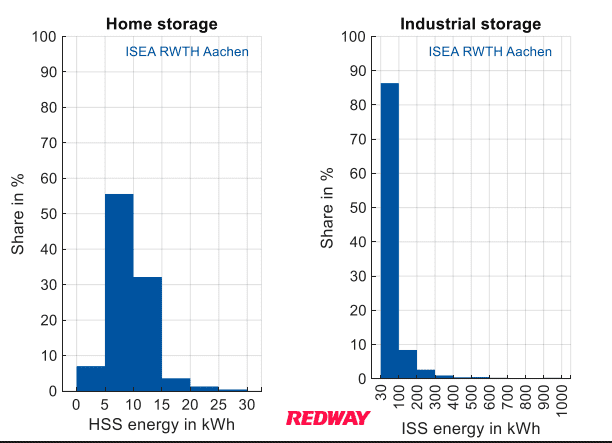In recent years, Germany has witnessed an extraordinary surge in its residential energy storage systems (HOME-ESS), with a remarkable 170% growth in installations. This growth signifies a pivotal shift in how households manage energy consumption, particularly in the face of rising electricity costs and a global push for sustainability. As we delve into this trend, we will explore the factors driving this growth, the implications for homeowners, and the future of residential energy storage in Germany.
The Surge in Energy Storage Systems
The adoption of residential energy storage systems has skyrocketed, with approximately 555,000 installations reported in 2023 alone. This translates to an impressive 5.0 GWh of stored capacity, marking a substantial increase compared to previous years. The growth trajectory not only highlights the increasing reliance on renewable energy sources but also underscores the need for efficient energy management solutions.
Key Statistics: 2023 Overview
| Metric | Value |
|---|---|
| Total Installations | 555,000 |
| Total Capacity | 5.0 GWh |
| Year-on-Year Growth | 170% |
| Projected Installations by 2024 | 2 million households |
Driving Factors Behind the Growth
Several key factors have contributed to this phenomenal growth in Germany’s HOME-ESS sector:
1. Rising Energy Costs
With electricity prices soaring, homeowners are increasingly seeking ways to reduce their energy bills. By investing in energy storage systems, households can store excess energy generated from solar panels during the day and utilize it during peak hours when electricity rates are higher.
2. Government Incentives and Policies
The German government has implemented various incentives to promote renewable energy adoption and energy efficiency. Programs aimed at achieving carbon neutrality by 2045 have spurred investments in residential energy storage systems, making them more financially attractive for homeowners.
3. Technological Advancements
Innovations in battery technology have led to more efficient and affordable residential energy storage solutions. These advancements have made it easier for homeowners to integrate energy storage into their existing systems, enhancing overall efficiency.
4. Increased Environmental Awareness
As public concern about climate change grows, more individuals are motivated to adopt sustainable practices. Energy storage systems allow homeowners to maximize their use of renewable resources, contributing to a greener future.
Implications for Homeowners
The rise of residential energy storage systems presents numerous benefits for homeowners:
1. Enhanced Energy Independence
With an energy storage system, households can significantly reduce their dependence on the grid. This independence not only provides financial savings but also enhances resilience during power outages or fluctuations in supply.
2. Improved Energy Management
Energy storage systems enable better management of electricity consumption. Homeowners can monitor their usage patterns and optimize their energy consumption based on real-time data, leading to further cost savings.
3. Increased Property Value
Investing in a residential energy storage system can enhance property value. As more buyers seek homes equipped with sustainable technologies, properties with integrated energy solutions are likely to attract higher offers.
Challenges Facing the HOME-ESS Market
Despite the positive outlook, several challenges must be addressed:
1. Regulatory Hurdles
While government incentives exist, navigating the regulatory landscape can be complex for homeowners looking to install energy storage systems. Clearer guidelines and streamlined processes are essential for fostering further growth.
2. Initial Investment Costs
Although prices have decreased over time, the upfront costs of purchasing and installing an energy storage system can still be significant for many households. Financial incentives and financing options will play a crucial role in overcoming this barrier.
3. Market Saturation Risks
As more households adopt energy storage solutions, there is potential for market saturation that could impact future growth rates. Companies must continue innovating to differentiate their offerings and meet evolving consumer needs.
Future Outlook for Germany’s HOME-ESS Market
The future of Germany’s residential energy storage market appears bright:
1. Continued Growth Projections
Analysts predict that installations will continue to rise, albeit at a slower pace than the explosive growth seen recently. By 2024, it is estimated that around two million one-family households will be utilizing residential energy storage systems.
2. Technological Innovations on the Horizon
Ongoing research and development efforts are expected to yield new technologies that enhance battery performance and reduce costs further. Innovations such as solid-state batteries may revolutionize the market by offering higher efficiency and safety.
3. Policy Support Remains Crucial
Sustained government support will be vital for maintaining momentum in the HOME-ESS sector. Policymakers must continue to create favorable conditions that encourage investment in renewable technologies and energy efficiency measures.
FAQs About Germany’s Residential Energy Storage Systems
Q1: What types of batteries are commonly used in HOME-ESS?
Lithium-ion batteries are predominantly used due to their high efficiency and longevity; however, other technologies like lead-acid batteries are also available but less common.
Q2: How do residential energy storage systems work?
These systems store excess electricity generated from renewable sources (like solar panels) during low-demand periods and release it during peak demand times or outages.
Q3: Are there financial incentives available for installing HOME-ESS?
Yes, various government programs offer subsidies and tax credits to encourage homeowners to invest in residential energy storage solutions.
Conclusion: A Bright Future Ahead for HOME-ESS in Germany
In conclusion, Germany’s residential energy storage system market is experiencing unprecedented growth with a remarkable 170% increase in installations over recent years. Driven by rising electricity costs, government incentives, technological advancements, and increased environmental awareness, this trend is set to continue shaping the future of sustainable living in Germany.As we look ahead, addressing challenges related to regulation and initial investment will be crucial for sustaining this momentum. For those interested in tapping into this burgeoning market or seeking reliable battery solutions, Redway Battery offers extensive experience in manufacturing high-quality Lithium LiFePO4 Batteries tailored to meet diverse needs worldwide.



